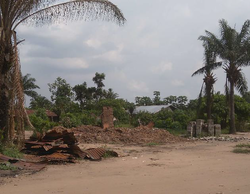Yumbi | |
|---|---|
Territory | |
 Destroyed buildings in Yumbi | |
| Coordinates: 1°54′02″S16°33′31″E / 1.900458°S 16.558628°E | |
| Country | |
| Province | Mai-Ndombe |
| Seat | Yumbi |
| Time zone | UTC+1 (WAT) |
| National language | Lingala |
Yumbi is a town and territory of Mai-Ndombe in the Democratic Republic of the Congo. It lies on the eastern bank of the Congo River between Bolobo and Lukolela. [1] The town of Yumbi is the headquarters of Yumbi Territory and has a population of approximately 30,000. [2] [3]
On February 2, 2003 a tornado killed 17 people in and near the town. Over 4,000 people were injured, 217 seriously. [4] [5]
